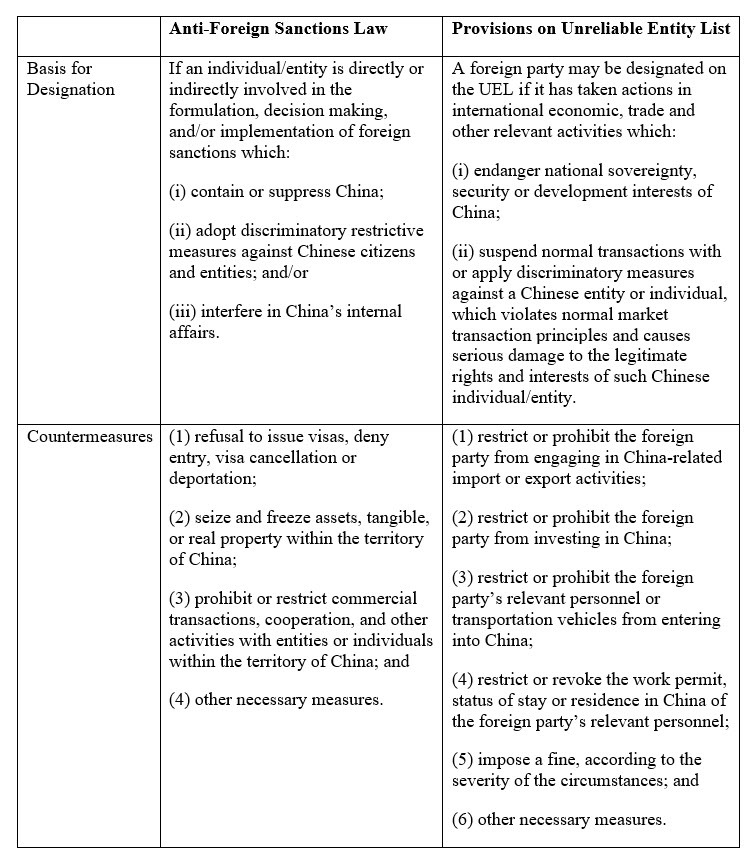Alert 01.13.21
Alert
China Passes Sweeping Anti-Foreign Sanctions Law
Takeaways
06.15.21
On June 10, 2021, the Anti-Foreign Sanctions Law came into effect. It expands on China’s previously promulgated Blocking Statute (the Rules on Counteracting Unjustified Extraterritorial Application of Foreign Legislation and Sanctions, detailed in this January 2021 client alert) and Unreliable Entity List Provisions (UEL Provisions, detailed in this September 2020 alert). Unlike the Blocking Statute and the UEL Provisions, which are departmental regulations of China’s State Council, the Anti-Foreign Sanctions Law is a national legislation that provides a sweeping legal basis for the Chinese government to take anti-sanctions countermeasures if a foreign country, in violation of international law and basic norms of international relations, is deemed to use excuses or its own laws to (i) contain or suppress China, (ii) adopt discriminatory restrictive measures against Chinese citizens and entities, and/or (iii) interfere with China’s internal affairs. (Article 3.)
Scope of the Anti-Sanctions List
According to Article 4 of the new law, if an individual or entity is directly or indirectly involved in the formulation, decision making, and/or implementation of the sanctions imposed by foreign countries, that individual or entity may be included in an anti-sanctions list.
In addition, the anti-sanctions list may expand beyond such individuals/entities to include:
- the spouses and immediate relatives of such individuals;
- senior managers or actual controllers of such entities;
- entities where such individuals serve as senior management personnel; and
- entities that are controlled, established, or operated by such individuals/entities.
Effect of the Anti-Sanctions List
The State Council may penalize individuals/entities on the anti-sanctions list by taking one or more of the following measures:
- refusal to issue visas, deny entry, visa cancellation or deportation;
- seizing and freezing assets, tangible or real property within the territory of China;
- prohibit or restrict commercial transactions, cooperation, and other activities with entities or individuals within the territory of China; and
- other necessary measures.
The measures are similar to sanctions imposed by the United States and other governments and appear to be akin to designation on the U.S. Treasury Department’s Specially Designated Nationals (SDN) List.
Comparison with UEL Provisions
The new law appears to have overlapping application with the UEL Provisions, as shown in the comparison table below. While the UEL Provisions focus on international economic and trade activities, the Anti-Foreign Sanctions Law applies more broadly to include activities with political nature. It is possible that a foreign party may be designated by both the UEL and the anti-sanctions list under the Anti-Foreign Sanctions Law if its actions are captured by both laws.

The Anti-Foreign Sanctions Law also does not provide a foreign party with any cure period for rectification or right to apply for removal from the list, which are available under the UEL Provisions.
Observations
The Anti-Foreign Sanctions Law imposes conflicting obligations for multinational companies with subsidiaries in China, including Hong Kong and Macao.
The new law prohibits all entities/individuals, whether foreign or domestic, from implementing or assisting in the implementation of foreign sanctions against Chinese citizens and entities. For example, a U.S. company that stops supplying products to a Chinese party designated on the SDN List may be deemed to be aiding or abetting in the implementation of a discriminatory restrictive measure; therefore, the U.S. company may be designated on the anti-sanctions list, and the Chinese party on the SDN List may sue that U.S. company in a Chinese court.
In addition, the new law requires that all entities and individuals (including subsidiaries of multinational companies and foreign citizens) in China (including Hong Kong and Macao) must comply with the countermeasures adopted by the State Council. Multinational entities with a presence in both the U.S. and China may face the dilemma of complying with U.S. sanctions or being on China’s anti-sanctions list.
It is unclear yet how broadly or often China will implement the Anti-Foreign Sanctions Law. However, it is advisable that multinational companies with operations in China develop China-specific risk assessment in implementing sanctions compliance programs.